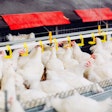
Several recent news reports exaggerated claims that current meat processing practices will cause a global climate catastrophe, while failing to mention the partisan source of the original research.
The study, published February 1 in PLOS Climate, alleges that “ending animal agriculture has the unique potential to significantly reduce atmospheric levels of all three major greenhouse gases, which, because we have dithered in responding to the climate crisis, is now necessary to avert climate catastrophe,” according to a statement from lead author, Michael Eisen, a professor of molecular and cell biology at the University of California, Berkeley.
Unsurprisingly, the second author of that paper is Patrick Brown, the CEO of Impossible Foods, one of the largest manufacturers of plant-based proteins. Eisen also serves as a consultant to the company.
Of course, Impossible Foods wants to end tradition meat production. They want you to eat their products, which include the Impossible Chicken Nuggets, a soy-based meat alternative that debuted last fall.
Advocates of meat alternatives tout the products as better for you, better for animals and better for the environment. I’ve already debunked claims that plant-based proteins are a healthier alternative to traditional proteins, now it’s time to talk about the environmental impact and sustainability efforts of poultry production and processing.
The poultry industry deserves credit for sustainability
Modern poultry production and processing has made huge strides in sustainability in recent years, something the public doesn’t give the industry enough credit for.
Between 2010 and 2020, the broiler industry decreased land use by 13%, greenhouse gas emissions by 18%, water consumption by 13%, fossil resources use by 22% and particulate forming emissions by 22%, according to the 2020 Broiler Chicken Industry Sustainability Report.
I’ve also been impressed with all the innovative ways the poultry industry is innovating to reduce environmental impact. In the past two years, I’ve written about several new technologies and projects that looked to find new uses for poultry processing byproducts, solar panel installations, efforts to reduce plastic waste during packaging, efforts to recycle poultry wastewater by using it to irrigate crops and feed formulations that use everything from brewery waste to insects.
Given the fact that a core group of consumers believe that agtech is the path to sustainability, it certainly feels like meat and poultry is being given an undeserved bad reputation here.

















